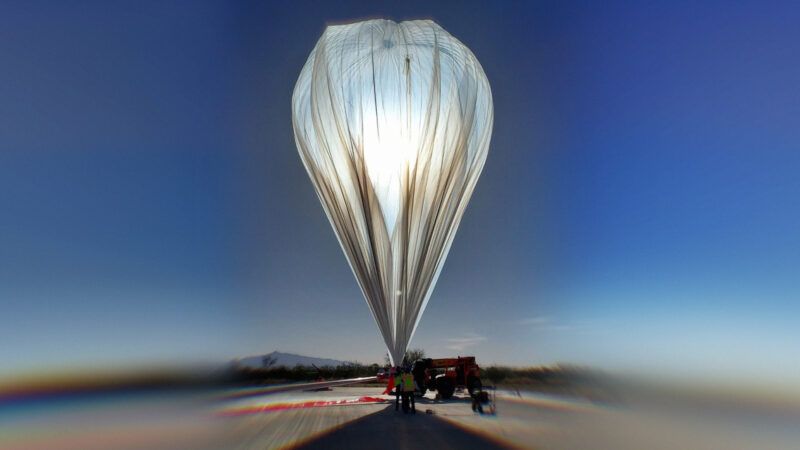Arizona Appeals Court Deflates Subsidies for Space Balloons
According to the ruling, the Pima County Board of Supervisors violated the state constitution's Gift Clause with its sweetheart deal to a space tourism company.

Government subsidies for sports stadiums are unfortunately common in many states. The practice continues even though it fundamentally involves giving taxpayer money to uberwealthy developers and franchise owners. But a recent court case from Arizona reveals a new spin on the public subsidy problem: passenger balloons to space.
World View Enterprises, a private space technology company based in Tucson, hopes to allow everyday citizens to experience what billionaires like Bezos, Branson, and Musk have achieved: a trip to space. While a ride on a Blue Origin, Virgin Galactic, or SpaceX rocket is still prohibitively expensive for all but the very wealthy, World View hopes to offer high-altitude balloon trips that would lift a pressurized passenger capsule 20 miles into the upper stratosphere to what is called "near space." One would not experience weightlessness (and the sticker price still runs $50,000 per ticket), but a participant would see stars and the Earth's curvature against the blackness of space.
But to get passengers to that point, World View needed some help. Enter local government: In January 2016, the Pima County Board of Supervisors approved $15 million in financial incentives for the company to establish its "world headquarters and first launchpad" just outside Tucson. The county would borrow the money through a bank loan, secured by offering several county buildings as collateral.
Per the agreement, the county would fund the construction of facilities, including a 135,000-square-foot manufacturing facility, with office spaces and a launch pad, on property it already owned. World View would then lease the property from the county for 20 years. In return, the company would hire more than 400 employees, with an average salary of over $55,000, and spend $32.3 million on equipment.
Twenty years of lease payments were expected to total around $14 million, estimated to be the property's value at that time. World View would then have the option to buy the facility for $10.
The Goldwater Institute, a free market think tank based in Arizona, sued to stop the project, which it termed a "balloondoggle." The filing alleged that the county had not only skirted competitive bidding laws and misrepresented the facts, but it had also violated the state constitution.
According to Timothy Sandefur, vice president of litigation at the Goldwater Institute, 45 state constitutions contain provisions forbidding public funds from being used to finance private projects. As Sandefur tells Reason, Arizona's constitution's Gift Clause is unique in that it not only prohibits using state funds for private projects, but it includes the phrase "by subsidy or otherwise."
Sandefur says that makes it completely unconstitutional for the state to offer to mortgage property to a private entity. Hence, the board of supervisors' plan to secure a loan, build a facility, rent it to a private company, and then transfer ownership for only $10 after the lease was over constituted a "commercial mortgage in disguise."
In its response, the county contended that state law gives it the authority to "appropriate and spend public monies for and in connection with economic development activities," but ignored whether or not the specific case violated the state constitution.
Last month, after more than six years of litigation, the Arizona Court of Appeals ruled that the agreement did violate the state constitution. Judge Karl C. Eppich wrote for the majority, "We agree with Taxpayers that the $10 purchase option amounts to an unconstitutional subsidy because the consideration received by Pima County is grossly disproportionate to the value of the World View facility."
To get around the constitutional prohibition against financing, the county structured the deal as a lease with a "lease-purchase provision." But the Court determined that since the lease payments can't be counted toward a purchase, the only amount that could be counted in World View's eventual purchase is the $10; as the court put it, "World View will be expected to pay .0000007 percent of the value of the Leased Facility to own it outright."
Sandefur contends that the agreement is even more pernicious than that and a bad deal for Pima County taxpayers.
There's no guarantee that World View will survive for 20 years; even compared with commercial space flight, $50,000 for a balloon ride seems like a hard sell. If a borrower walks away before a loan is paid, the financier keeps the property and could then sell it for full market value. But this facility was built to World View's exact specifications. The property may very well appraise for $14 million at the end of the lease, but anyone who purchased it at that time and didn't also want to manufacture and launch high-altitude balloons would have to spend millions more to tailor it to their own needs.
A county administrator called the lawsuit "politically-motivated" and indicated that the board of supervisors was considering whether to appeal the ruling to the Arizona Supreme Court.
As with stadium subsidies, it's entirely possible that the balloon project could produce indirect benefits sufficient to justify such an expenditure. But it could just as easily fail, and in that case, taxpayers would be stuck holding the bag. Business expenditures are inherently risky, and those risks should be borne by private companies and private lenders.


Show Comments (29)